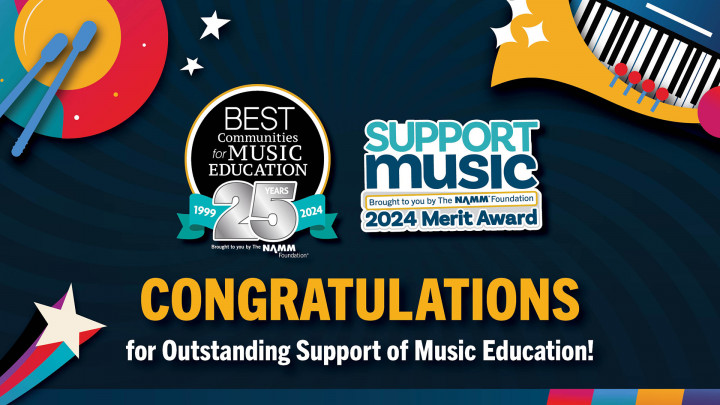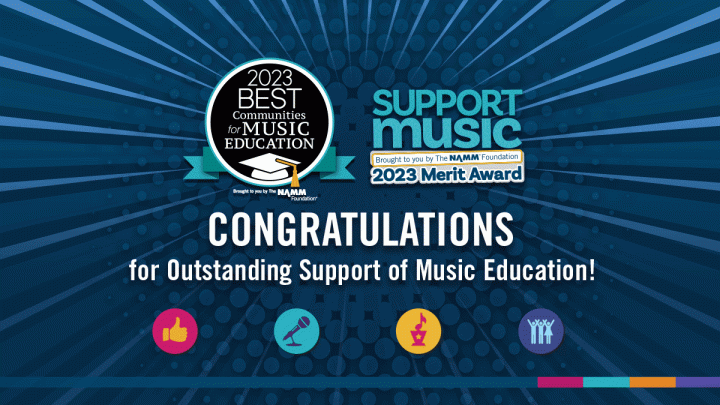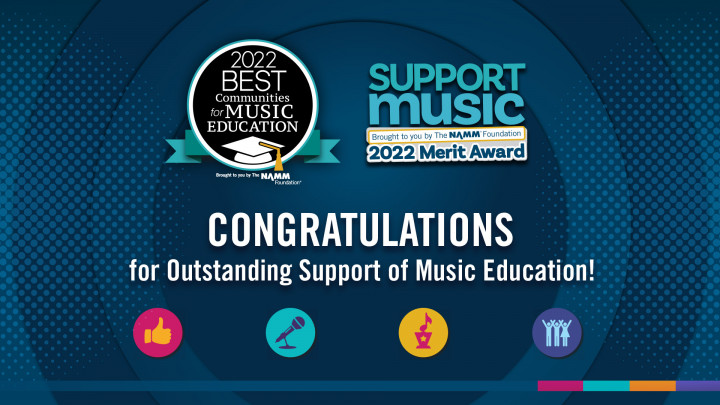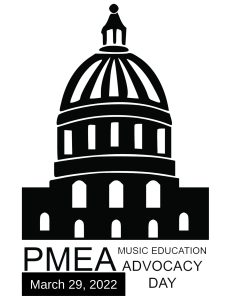The NAMM Foundation Celebrates 25 Years of Best Communities for Music Education
The Best Communities for Music Education acknowledges over 1,000 schools and districts across the United States for their commitment and support of music education. The NAMM Foundation has announced the recipients of its 2024 Best Communities for Music Education (BCME) Awards, a signature program now in its 25th year of recognizing and celebrating school districts and individual schools for their support and commitment to music education and their efforts to ensure access to music for all students as part of a well-rounded education.
Learn more at www.nammfoundation.org
Here are the Pennsylvania Best Communities and SupportMusic Merit Award designees. Congratulations!

BEST COMMUNITIES FOR MUSIC EDUCATION
| Clarks Summit | PA | |
| Abington | PA | |
| Reading | PA | |
| Kittanning | PA | |
| West Grove | PA | |
| Pittsburgh | PA | |
| Wingate | PA | |
| Bellefonte | PA | |
| Bensalem | PA | |
| York Springs | PA | |
| Bethel Park | PA | |
| Bethlehem | PA | |
| Beaver Falls | PA | |
| Newville | PA | |
| Beaver Falls | PA | |
| Boyertown | PA | |
| Lower Burrell | PA | |
| Patton | PA | |
| Canonsburg | PA | |
| Warminster | PA | |
| Doylestown | PA | |
| Ebensburg | PA | |
| Harrisburg | PA | |
| Waynesburg | PA | |
| Monaca | PA | |
| York | PA | |
| Fishertown | PA | |
| Clairton | PA | |
| Clearfield | PA | |
| Plymouth Meeting | PA | |
| Lancaster | PA | |
| Lebanon | PA | |
| Newtown | PA | |
| Mechanicsburg | PA | |
| Curwensville | PA | |
| Milford | PA | |
| Hershey | PA | |
| Dover | PA | |
| Downingtown | PA | |
| Dubois | PA | |
| North Versailles | PA | |
| Emmaus | PA | |
| East Stroudsburg | PA | |
| Easton | PA | |
| Springville | PA | |
| Ephrata | PA | |
| Reading | PA | |
| Pittsburgh | PA | |
| Murrysville | PA | |
| Freedom | PA | |
| Freeport | PA | |
| Glen Mills | PA | |
| Edinboro | PA | |
| Flinton | PA | |
| Shillington | PA | |
| Latrobe | PA | |
| Horsham | PA | |
| Greensburg | PA | |
| Hollidaysburg | PA | |
| Aliquippa | PA | |
| Huntingdon | PA | |
| Vandergrift | PA | |
| Kutztown | PA | |
| Factoryville | PA | |
| Lewisburg | PA | |
| Ardmore | PA | |
| Huntingdon Valley | PA | |
| Williamsport | PA | |
| Lancaster | PA | |
| Newtown Square | PA | |
| Eagleville | PA | |
| Lewistown | PA | |
| Minersville | PA | |
| Monotursville | PA | |
| Moon Township | PA | |
| Mount Pleasant | PA | |
| Pittsburgh | PA | |
| Nazareth | PA | |
| Langhorne | PA | |
| New Hope | PA | |
| Norristown | PA | |
| Pittsburgh | PA | |
| Pittsburgh | PA | |
| Lansdale | PA | |
| Ashland | PA | |
| Loysburg | PA | |
| New Tripoli | PA | |
| North Huntingdon | PA | |
| Oley | PA | |
| Oxford | PA | |
| Allentown | PA | |
| Perkasie | PA | |
| Fallsington | PA | |
| Collegeville | PA | |
| Phoenixville | PA | |
| Swiftwater | PA | |
| Port Allegany | PA | |
| Pottstown | PA | |
| Pottstown | PA | |
| Red Lion | PA | |
| Hellertown | PA | |
| Lancaster | PA | |
| Philadelphia | PA | |
| Oreland | PA | |
| Harmony | PA | |
| Glenshaw | PA | |
| Shenandoah | PA | |
| New Castle | PA | |
| Quarryville | PA | |
| Somerset | PA | |
| McKeesport | PA | |
| McDonald | PA | |
| Hookstown | PA | |
| Center Valley | PA | |
| Spring Grove | PA | |
| Springfield | PA | |
| Royersford | PA | |
| State College | PA | |
| Stroudsburg | PA | |
| Havertown | PA | |
| Jenkintown | PA | |
| Titusville | PA | |
| Washington | PA | |
| Tunkhannock | PA | |
| Pennsburg | PA | |
| Upper St. Clair | PA | |
| Lititz | PA | |
| Waynesboro | PA | |
| Imperial | PA | |
| Morrisdale | PA | |
| Exton | PA | |
| York | PA | |
| Lake Ariel | PA | |
| Williamsport | PA | |
| West Lawn | PA | |
| North Braddock | PA | |
| Wyomissing | PA | |
| York | PA | |
| Herminie | PA |
SUPPORTMUSIC MERIT AWARD
| Philadelphia | PA | |
| Lancaster | PA | |
| Lancaster | PA | |
| Bethlehem | PA | |
| Philadelphia | PA | |
| Old Forge | PA | |
| McKeesport | PA | |
| Clearfield | PA | |
| Tidioute | PA | |
| Wilkinsburg | PA |




